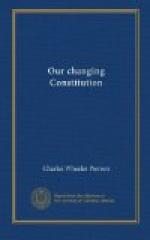At the outset it is essential to determine the exact nature of the tax. Obviously it is not a tax upon income as income. If it were, it would be obnoxious to the decision in the Pollock case as imposing a direct tax without apportionment among the states. The language of the act, as well as the declarations of its sponsors, clearly indicate that it is intended, not as a direct tax on property, but as an excise tax on privilege. The phraseology of the act itself is—“A special excise tax with respect to the carrying on or doing business by such corporation,” etc. Undoubtedly Congress has power to impose an excise tax upon occupation or business. This was expressly decided, in the case of the businesses of refining petroleum and refining sugar, by the Spreckels case,[1] referred to in President Taft’s message. The message says:
The decision of the Supreme Court in the case of Spreckels Sugar Refining Company against McClain (192 U.S., 397) seems clearly to establish the principle that such a tax as this is an excise tax upon privilege and not a direct tax on property, and is within the federal power without apportionment according to population.
[Footnote 1: Spreckels Sugar Refining Co. vs. McClain, 192 U.S., 397.]
What, then, is the privilege with respect to which the tax is imposed? Is it, like the tax involved in the Spreckels case, the privilege of doing the various kinds of business (manufacturing, mercantile, and the rest) in which the corporations subject to the operation of the law are engaged? Obviously not. No kind or kinds of business are specified in the act. The tax falls not only on corporations doing every conceivable kind of business, but also on the corporation that does no specific business whatever—the corporation which, in the language of an eminent judge, is merely “an incorporated gentleman of leisure."[1] Moreover, if the tax were merely upon the privilege of doing business, it would seem to be obnoxious to the cardinal principle of just taxation that taxes should be uniform. In other words, if the privilege of doing a business—say conducting a department store—were the thing taxed and the only thing taxed, the rule of uniformity would seem to require that a corporation and a copartnership conducting similar stores on opposite corners of the street should both be taxed. Nothing inconsistent with this view will be found in the Spreckels case. The party to that suit was, to be sure, a corporation, but the act under which the tax was imposed applied to individuals, firms, and corporations alike.
[Footnote 1: Vann, J., in People ex rel. vs. Roberts, 154 N.Y., 1.]
It must be concluded, therefore, that the tax is not upon the privilege of doing the businesses in which the various corporations in the land are engaged, but is rather a tax upon the privilege of doing business in a corporate capacity, or, in other words, upon the exercise of the corporate franchise. That this is so appears very clearly from the message of President Taft. He says:




